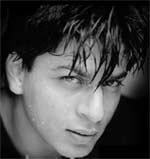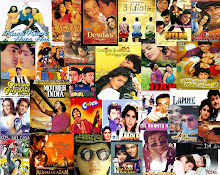
In early 2002, after buying a VCR, I began purchasing films. As my film library grew, I decided to broaden my horizons and check the foreign film selections. Among the first foreign films I bought was an Indian film called Asoka.
My previous experience with Indian films was Gandhi. After Asoka’s closing credits rolled down the screen, I was transfixed. Indian films were different from western films. They were three hours long with song and dance routines dispersed throughout. Female actresses looked like real women not like the skinny twenty-year-olds in western films. Men expressed emotions, and multiple generations were represented. Though the dialogue was Hindi, the stories and body language were universal.
I wanted to know more, so I entered the male star’s name, Shah Rukh Khan, into Google and it came up with over a million hits.
It didn’t take long to realize Shah Rukh Khan was a major Bollywood star. To learn more I read about Khan’s life and career. I also immersed myself in his films I got from a local Indian video store.
Some of the best parts of Indian movies, for me, are the song and dance routines, the women’s saris and jewelry, and the doti of the men. I love the energy and style of the dancing, especially the choreography of Farah Khan and Pandit Birju Maharaj. Every woman, no matter her age or shape, looks great in a sari and the men look regal.
Because of many changes in my life during this time, I was grateful to escape into the world of Indian film because it wasn’t here. I could lose myself in another world. I bought a sari and Indian jewelry. I learned a few words in Hindi, drank chai tea, ate Indian food, followed Indian news, and got an India travel guide.
Often when watching Indian movies, you are watching both the story on the screen and also the story of a changing culture. I struggled with the concept of understanding India through its films when I asked myself, “Did western films really reflect the history and culture of my world?” I didn’t think so. But, for the moment, Indian films were all I had.
India’s history is thousands of years old (2500 BC). With a population over one billion, with hundreds of different nationalities and religions, conflict was common.
As I followed Indian news, I watched the nation struggle with cultural conflicts, religious and political, that were often violent. In fact, during the height of my obsession, I had hoped to make a short trip to Mumbai but when the Victorian train station in Mumbai was bombed, I changed my mind. I continue to follow the news in all 29 states and 6 territories of India as they struggle with political unrest, varying economic conditions, corruption, poverty, and the struggle over the sovereignty of Kashmir. India claimed independence from British rule in 1948 after many bitter struggles and the establishment of a Muslim nation, Pakistan and Bangladesh. Kashmir remains, today, a disputed territory.
Indian films reflect these issues and more. In Indian films, you get drama, humor, tragedy, suspense, and celebration.
On screen emotional struggles are often raw and awkward in contrast to the slick dialogue of western movies. In Indian movies, characters are portrayed in exaggerated terms leaving no doubt who is good or evil.
One common conflict in Indian films is forbidden love. Arranged marriages are part of India’s culture but India’s youth are pushing for finding their own love matches, so Indian films reflect this cultural schism.
Another underlying motif of modern Indian films is the historical territorial power struggle of powerful Rajas transferred to political families, large corporations, or corrupt gangs.
Scandals in 2003 about mafia influence in the Indian film industry exposed the corruption that Indian society has not brought under control.
The Indian film industry produces over 800 films a year. It is the biggest film industry in the world.
By the time, I watched Asoka, Khan had become a producer as well as actor. He had been married for over 10 years and had two children.
As I continued to watch Khan’s films and other Indian films, read film reviews and interviews, I came to admire Shah Rukh Khan. His personality shone through in all of his characters. He is a good person. He is generous and passionate. He is energetic, expressive, funny, and attractive.
His philosophy about acting is focused on his audience: “I was here to ask for love. I was here to woo them not impress them. I was here to make them realize I was just one of them, like them, except that my job puts me in different situations and stories. And if I was able to hold up this mirror to everyone I was sure my audience would appreciate me because they would reciprocate their love to one of their own….”
Khan was accessible. He was open and honest in his interviews. He was also humble and some say arrogant. He handled his rise to stardom well. He never lost his sense of himself. He gives god credit for his success. He puts his family and friends first. He is loyal to those who supported him in his career. He took risks. He had become phenomena as one of the most widely recognized and admired stars in India, Asia, and Britain.
Because I found his life’s story interesting, I wanted to understand how he made some of the major decisions in his life. How did he decide to become a film actor? Where did he meet his wife? How did he handle success? How did he handle conflict? How did he choose his films? What were his future plans?
All my questions made me wonder about the concept of a role model. Who were my role models? Should film stars be considered role models? How does one feel about this additional life-long role assigned to them?
Khan has great praise for his parents. His parents were his role models. His mother, Fatima, was an Oxford-educated magistrate. His father, Mir Taj Mohammed, was a freedom fighter and a sensitive, intelligent man. They encouraged him and expected him to do well, but did not put many restrictions on him. His father had started several businesses but was not a great businessman. His family’s economics fluctuated but Shah Rukh Khan never felt deprived.
Khan was intelligent and had determination. When faced with getting a zero in learning Hindi in grade school, he studied late into the night until he got tens.
In college, he majored in mass communication and enjoyed advertising art. He also excelled in sports and wanted to pursue a professional sports career. But, an injury changed those plans. “One cannot be sure of one’s best efforts…. as sometimes your best is just not good enough. And that is one truth I live by even today. One should not get disappointed but try hard next time.” A friend suggested he try television. Khan always turns a negative experience into a positive one.
He loved his parents but lost them early in his life, his father at 15, his mother in his early 20s. He openly grieves their loss in most interviews. “Mother taught me that nothing is permanent…. So enjoy what you have this moment, for it can be taken away from you the next. Everything is transient.”
At 19, he fell in love with Gauri Chibber, a Hindu girl. Khan is Muslim. They dated in secrecy because mixed marriages in India are frowned upon. His future wife’s family disapproved of their engagement, so much so his fiancé’s mother went on a hunger strike. Alternating crowds stood outside his home in Delhi to protest their marriage. Hindus came in the morning, Muslims in the evening.
Undeterred, Khan eventually charmed Gauri’s whole family. On their wedding day, he eagerly participated in the Hindu wedding ceremony, which has many rituals. Khan wanted to know the meaning of each one. As he and Gauri, prepared to leave, her family wept over losing her. To ease their pain, Khan offered to let her stay and he would just visit frequently.

He is known for professing his love for his wife, Gauri, and their family.
Khan was a good student but for some unknown reason, Khan’s college dean discouraged him from continuing in college. Yet, Khan is philosophical about the detours in his life, he feels "no experience that you have in life can ever be wasted."
He had success in several television series and decided to try film, so Khan, his wife, and sister moved to Mumbai. In India, it is common for extended families live together.
Khan has won many awards and made box office history with the movie, Dilwale Dulhania Le Jayenge (Braveheart Takes a Bride), which ran to packed houses for over five years and is still running today. Khan is practical about his acting talents, he feels he has a limited range of expressions but he says “If you can pull it off, it’s a performance, if not it was just an accident, try and do it again and again till one day you die.”
Khan's philosophy about business and money is "These four principles cover my business philosophy: You should work for it, you should not lose money in any business, you should make enough money so that you are in a position of choice. And finally, if you start a business employing a lot of people, the end result, regardless of whether it made money or not, should be that all those people involved should be happy that they gave it a shot. He also believes one should have a greed for: knowledge, money so that you can have choice, and love.
Shah Rukh Khan loves New York City, and came to promote Asoka in September 2001. He and his family were only a few blocks away on September 11. As Khan notes, “We could see the clouds of dust and smoke that engulfed the sky…. the situation was so surreal.” Khan sat by the window for hours, “the police coming, the smoke rising and everything, it was very shocking.”
This was my first experience with fandom. I had never been so taken with a star or an industry. I began to see the positive side of fandom as well as the negative.
Life often requires us to review our perspectives, our feelings, our attitudes, our values, and our actions. I had become stale and rigid in my routines and my views of the world and life. Shah Rukh Khan became a role model for me because I learned from him some of the qualities about making good choices, and the importance of hard work, determination, humility, gratitude, loyalty, humor, love, and joy.
In March 2003, I learned Khan was going to have surgery to correct a longstanding back injury. I, along with millions of others, sent him get-well wishes.
Caring about someone even from afar made a difference in my life.
###

2 comments:
Hi,
What an interesting post... You certainly have a knack for telling your views about films and interperse them with other more general thoughts. And this discourse about your discovery of SRK deserves to be better known. Thanks!
yves
Yves, thanks for the compliments on my blog. I credit Shah Rukh Khan for giving me the world. I now read International news alot more than I ever did and I have made many new friends because of SRK. Thanks again, keep writing, m
Post a Comment